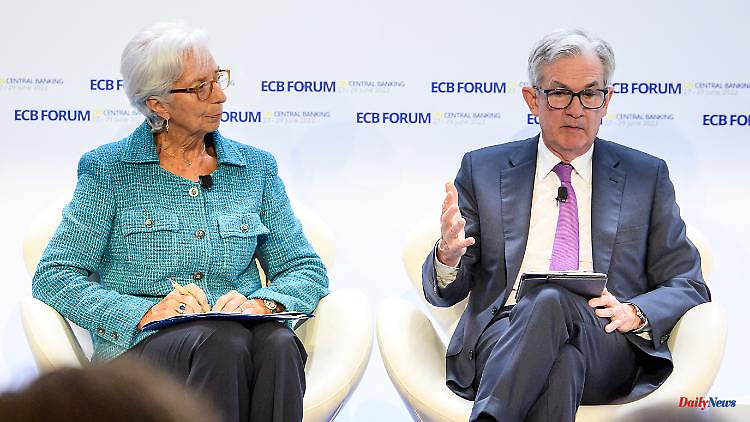The eurozone is suffering from high inflation. ECB boss Christine Lagarde gives little hope that this will change soon. The European Central Bank is likely to raise interest rates in July.
The days of low interest rates and low inflation are coming to an end and are unlikely to return in the long term. Two people agree on this, whose assessment of this topic is not entirely insignificant: Christine Lagarde, head of the European Central Bank, and Jerome Powell, head of the US Federal Reserve.
The corona pandemic and the Russian war of aggression in Ukraine have changed the world forever, they said at the ECB's monetary policy symposium in Sintra, Portugal. "I don't think we're going back to a low-inflation environment," Lagarde said.
That sounded different for a long time. For obvious reasons, the ECB had assumed that inflation would fall sharply again on its own in the medium term. Because during the pandemic, corona lockdowns had disrupted international supply chains, leading to supply bottlenecks and thus to higher prices. The supply chains would straighten out again, was the assumption. In addition, energy prices would fall again at the end of the heating season.
But nothing came of it. The Chinese leadership's zero-Covid policy with tough lockdowns keeps disrupting supply chains. Strikes, which temporarily paralyze the handling of container and cargo ships in large North Sea ports, also contribute to this. In addition, the attack on Ukraine made oil and gas much more expensive.
Against this background, inflation literally went through the roof. In the US, it reached 8.6 percent in May, the highest level in more than 40 years. In the euro zone, prices rose by 8.1 percent. At the moment it looks like the momentum is losing some momentum. But it will probably be a while before inflation is back in the green at around 2 percent.
And it will also require further rate hikes. The ECB is now forced to raise interest rates after a long hesitation. It is considered a foregone conclusion that it will leave the zero line in July. In September - that's the current plan - a second rate hike is to follow. The Fed is already further: In the USA, interest rates are in the range between 1.5 and 1.75 percent.
How much the ECB's assessment has changed is shown, for example, by Lagarde's warning to overstate the unexpected drop in inflation in Germany in June. Meanwhile, Fed Chairman Powell has assured that he will raise interest rates as often and as quickly as necessary to bring inflation under control. In order to achieve this goal, it is even willing to trigger a recession. "This process will probably cause some pain. But the most intense pain would come if we (...) allow high inflation to take hold," Powell said.
However, the environment in which the central banks operate has changed over the long term. For example, the pandemic and the Russian attack have shown how vulnerable supply chains are. In the face of export bans, lockdowns and sanctions, many companies are considering shortening their just-in-time supply chains, making them more secure and increasing inventories - even if this makes production more expensive.
Lagarde and Powell went a step further and warned that the globalized world could split into competing trading blocs. The consequences: disrupted supply chains, higher costs, lower productivity. Companies would have to include another factor in their calculations in the future, said Lagarde. When choosing suppliers and the location of a factory, it is also relevant where it is located - with "friends or opponents".
"We now have to deal with new circumstances and think about monetary policy in a different way," Powell said. In future it will be even more difficult to assess how inflation will develop. "We now better understand how little we know about inflation."












